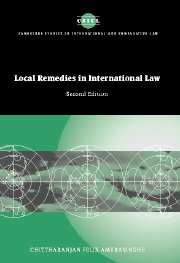Book contents
- Frontmatter
- Contents
- Preface
- Table of cases
- List of abbreviations
- Part I Prolegomena
- 1 Introduction
- 2 The evolution of the law relating to local remedies
- 3 Basis of the rule
- 4 The rule, denial of justice and violation of international law
- 5 Contracts, violation of international law, denial of justice and the rule
- Part II Application of the rule
- Part III Peripheral and analogous applications of the rule
- Part IV Nature of the rule
- Part V Epilogue
- Index
- CAMBRIDGE STUDIES IN INTERNATIONAL AND COMPARATIVE LAW
4 - The rule, denial of justice and violation of international law
from Part I - Prolegomena
Published online by Cambridge University Press: 03 May 2010
- Frontmatter
- Contents
- Preface
- Table of cases
- List of abbreviations
- Part I Prolegomena
- 1 Introduction
- 2 The evolution of the law relating to local remedies
- 3 Basis of the rule
- 4 The rule, denial of justice and violation of international law
- 5 Contracts, violation of international law, denial of justice and the rule
- Part II Application of the rule
- Part III Peripheral and analogous applications of the rule
- Part IV Nature of the rule
- Part V Epilogue
- Index
- CAMBRIDGE STUDIES IN INTERNATIONAL AND COMPARATIVE LAW
Summary
It is not within the scope of this work to discuss in detail here the concept of denial of justice as it is relevant to the law of state responsibility for injuries to aliens, or definitively to identify its specific coverage. However, since there has been in the past some confusion as to both its meaning and its relationship to the law relating to the exhaustion of local remedies, a brief consideration of the meaning of the concept and of how it is connected to the rule of local remedies in the law of diplomatic protection is required. It may be noted at the outset that the same confusion has not occurred in connection with the application of the rule to the protection of human rights as has been prevalent in regard to the law of diplomatic protection per se. This may have some significant bearing on the discussion of the issues involved, as it may show that denial of justice does not by its true nature basically affect the rule of local remedies when the rule is considered in its proper sense and dimensions and when the application of the rule is treated as being confined to the situations to which it is in terms of its purpose and nature meant to be applicable.
- Type
- Chapter
- Information
- Local Remedies in International Law , pp. 84 - 106Publisher: Cambridge University PressPrint publication year: 2004



